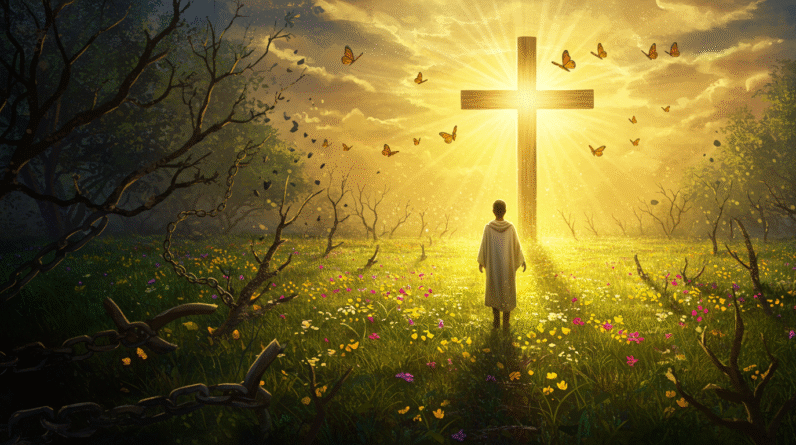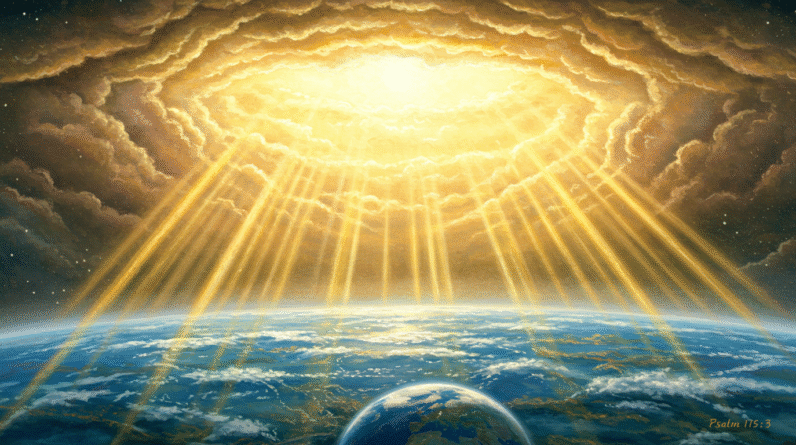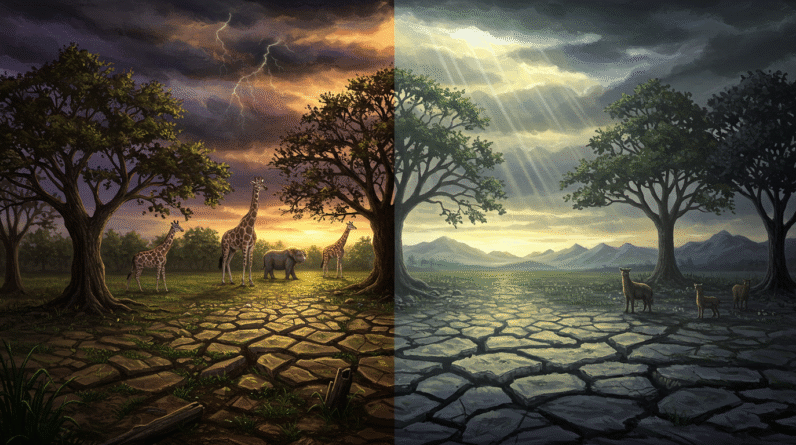The Order And Goodness Of Creation (Genesis 1:31)
When you read Genesis 1 slowly, something settles over your heart: there is design, intention, and delight. The final sentence of the creation account—“God saw all that he had made, and it was very good”—feels like a benediction written for you to hear and receive. You’re invited to stand back with the Creator, to look over the universe and feel the weight of goodness and order that comes from his hand. That invitation matters because it roots everything you are and everything you hope in the character of God as Creator. If you want to understand Scripture’s big story, begin here: in a world made well by a God who delights in his work. See Genesis 1:31.
Reading Genesis 1:31 in Context
Genesis 1:31 does not float by itself; it sits at the end of six days of ordered, purposeful activity. Each day builds on the last: light separated from darkness, sky and sea set in their places, land commanded to rise, plants given seed, lights installed for signs and seasons, creatures filling the waters, birds filling the sky, and animals filling the land. Finally, humankind is made in the divine image and given stewardship. When you look at the whole account—Genesis 1:1–31—you see a careful rhythm: God speaks, creation responds, God sees, God blesses. That rhythm tells you something about the mind of God: he creates in order, he orders for flourishing, and he pronounces his approval on the finished work.
The Pattern of Order in the Days of Creation
The order of creation is not merely a sequence of events; it’s a blueprint for how God brings life and stability from nothing. Light comes before the sun and moon are set to govern day and night. The waters are gathered before dry land appears. Plants and fruit precede the tasks of animals and people, ensuring the prerequisites for life are in place. This pattern teaches you that God’s activity is intentional and purposeful. When you read the narrative of those six days, found in Genesis 1, you are watching a sovereign God institute order—cosmic, ecological, moral—so that life can flourish in a world under his rule.
The Goodness Declared Repeatedly
Notice how the refrain “God saw that it was good” repeats after each creative act. You can find those words throughout the chapter: on day one, Genesis 1:4, day tw,o Genesis 1:8, and on through the forming of animals and humankind. Each declaration of goodness is not merely aesthetic praise; it’s a theological statement. The goodness reflects God’s character—his delight, his wisdom, his moral beauty. When you stand before a sunrise, witness a newborn child, or tend a garden, you are experiencing echoes of that original assessment. The world was made to be enjoyed and stewarded, not exploited, because its very basis is the Creator’s goodwill. See, for example, Genesis 1:10 and Genesis 1:21.
God’s Character Revealed Through Creation
Creation is God’s visible sermon. Scripture tells you that the heavens declare God’s glory and the skies proclaim the work of his hands, words that lift off the page in Psalm 19:1. When you consider the complexity, scale, and beauty of the world, you’re standing before a revelation of God’s power, wisdom, and goodness. Job reminds you that the Creator knows how he stretched out the heavens (Job 38:4–7), and Isaiah insists that God formed the earth to be inhabited, not by accident but by divine intent (Isaiah 45:18). The pattern of creation is a mirror of God’s mind; when you observe order in the world, you are seeing the ordered nature of the One who made it.
Jesus and the Word at Work in Creation
In the New Testament, the voice that spoke worlds into being is identified with the Word who is Christ. John opens his gospel by saying the Word was with God in the beginning and that all things were made through him (John 1:1–3). Likewise, Paul teaches that in Christ all things were created, visible and invisible—and that he holds all things together (Colossians 1:16–17). This means when you cherish creation, you are also honoring the Creator-Sustainer, Jesus Christ. The order and goodness you see are inseparable from his person and work.

Humanity’s Place: Made in God’s Image
Perhaps most striking in the Genesis story is the crowning act: humankind created in the image of God. God’s declaration about humanity—“Let us make mankind in our image, in our likeness” (Genesis 1:26)—places a unique dignity and responsibility on you. You are not a random product of chance; you are fashioned to reflect God’s character in ways of relationship, creativity, moral agency, and stewardship. That vocation means you are called to care for the earth, to cultivate it, and to govern it under God’s authority (Genesis 1:28). When you take up that role, your labor becomes a form of worship.
Creation’s Testimony: God’s Invisible Attributes
The apostle Paul points out that creation itself makes God known. He argues that what may be known about God is plain to people because God has shown it through the things made, so that men are without excuse (Romans 1:20). When you look at the intricacy of an eye, the complexity of ecological systems, or the moral sense written on human hearts, you’re confronted with the invisible attributes of God—his eternal power, his divine nature. Creation witnesses to God. Your response should be humility and worship, recognizing that everything you admire in the world points to the One who made it.
The Wound of the Fall and Creation’s Groaning
Yet Genesis also tells you a story that takes a dark turn. With the fall in Genesis 3, disorder and moral decay enter into God’s good world. The created order, which once reflected harmony, now bears the scars of rebellion. Paul speaks of creation being subjected to frustration and in bondage to decay, eagerly awaiting its liberation in the future—the whole creation groans as it waits for redemption (Romans 8:20–22). This theological truth helps you make sense of suffering, disaster, and dysfunction in the natural world: they are not God’s original intention, but consequences of human disobedience.
Stewardship, Not Dominion in the Modern Sense
You are given dominion in Genesis, but that dominion is a stewardship, not a license for exploitation. When God made you ruler over the fish and birds and every living creature, he was entrusting you with care for a good creation. Psalm 8 frames this by marveling at the place of humanity in God’s work: crowned with glory and honor, yet dependent on God’s sustaining providence (Psalm 8:3–8). Your choices as an individual and as a society—how you use resources, how you treat the poor, how you respond to environmental threats—reflect whether you’ve embraced the biblical call to steward the earth well.
Redemption’s Heart: Christ Reconciling All Things
The story doesn’t end in disorder. The Bible promises restoration. The gospel is not just about individual souls; it’s about the renewal of all things. Paul tells you that God was pleased to have all his fullness dwell in Christ and through him to reconcile to himself all things, whether things on earth or things in heaven, by making peace through his blood (Colossians 1:19–20). Revelation lifts the curtain further and portrays a new heavens and a new earth where the former things have passed away and God dwells with his people (Revelation 21:1–5). When you trust Christ, you join the story of restoration that God is writing over creation.
Worship and Wonder as a Daily Response
How should you live in light of creation’s order and goodness? Start with worship. The cosmos was made to tell God’s glory, and your life is the place where that glory can be echoed. Psalm 95 calls you to come into God’s presence with thanksgiving and joyful songs, because he is your Maker and you are his people (Psalm 95:1–7). Let gratitude shape your days—whether you’re watching children play, planting a garden, or pausing to see the sunrise. Worship transforms how you use the world; it makes you a grateful steward rather than a greedy consumer.
The Gospel: Your Need and God’s Solution
If you feel the weight of the brokenness in the world and in your life, know that the gospel speaks directly to that need. The same God who made things very good has acted to restore what sin has marred. Christ took on flesh, entered the created order, and bore the curse to reconcile you to God. Jesus’ death and resurrection make repair possible, not just for your soul but ultimately for all creation. When you place your trust in him, you receive forgiveness and become part of God’s new creation work. Hebrews assures you that by faith you understand that the universe was formed at God’s command, so that what is seen was not made out of what was visible (Hebrews 11:3). Faith opens your eyes to the Creator’s designs and to the hope of restoration.
Practical Ways You Honor the Creator in Daily Life
Living out your calling as steward and worshiper can take many simple, concrete forms. You can practice care by conserving resources, supporting justice for the poor and vulnerable, and advocating for policies that protect creation. You can cultivate simplicity in a consumer culture and teach your children to see the world as a gift. You can also engage in acts of mercy and reconciliation that reflect God’s concern for both people and the planet. All these actions are not merely political or social—they are theological. They flow from a conviction that God is Creator and that his order is meant for flourishing.
The Hope That Shapes Your Tomorrow
Because God declared the world “very good,” you can speak and live with hope. Even amid environmental crises, moral decay, and personal suffering, the promise of new creation anchors you. Revelation’s vision of God making all things new (Revelation 21:5) reminds you that the final word is not chaos but restoration. That hope does not excuse passivity; rather, it fuels faithful action today, knowing that your efforts to care for creation and to share the good news have eternal significance. You are part of God’s unfolding drama, called to participate in redemptive work now and to rejoice in the consummation to come.
Conclusion: Return to the Creator and the Call to Praise
When you return to Genesis 1:31, you receive a profound reminder: the world was made by a good God, ordered for life, and pronounced worthy. That conviction should shape your theology, your ethics, and your worship. If you have wandered or allowed doubt to dull your wonder, come back to the Maker. He invites you to trust him, to serve as a faithful steward, and to join his redeeming work through faith in Jesus Christ. If you don’t yet know that Savior, God’s invitation is open to you—receive his grace, repent, and begin to live in the confidence that the Creator who made all things good is also the Redeemer who makes all things new. For the hope of creation and the salvation of your soul, there is no surer anchor than the love of God in Christ.
Explore More
For further reading and encouragement, check out these posts:
👉 7 Bible Verses About Faith in Hard Times
👉 Job’s Faith: What We Can Learn From His Trials
👉 How To Trust God When Everything Falls Apart
👉 Why God Allows Suffering – A Biblical Perspective
👉 Faith Over Fear: How To Stand Strong In Uncertain Seasons
👉 How To Encourage Someone Struggling With Their Faith
👉 5 Prayers for Strength When You’re Feeling Weak

📘 Jesus and the Woman Caught in Adultery – Grace and Mercy Over Judgement
A powerful retelling of John 8:1-11. This book brings to life the depth of forgiveness, mercy, and God’s unwavering love.
👉 Check it now on Amazon
As a ClickBank & Amazon Affiliate, I earn from qualifying purchases.
Acknowledgment: All Bible verses referenced in this article were accessed via Bible Gateway (or Bible Hub).
“Want to explore more? Check out our latest post on Why Jesus? and discover the life-changing truth of the Gospel!”








